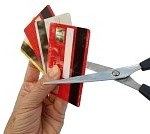 Most people experience financial trouble at some point in their adult lives. And this is often at least partially due to the fact that many of us are never taught how to properly manage money. Over time, bad decisions can turn into bad habits where spending and saving practices are concerned. But you can break the cycle. Here are some tips that should help you to break your bad money habits.
Most people experience financial trouble at some point in their adult lives. And this is often at least partially due to the fact that many of us are never taught how to properly manage money. Over time, bad decisions can turn into bad habits where spending and saving practices are concerned. But you can break the cycle. Here are some tips that should help you to break your bad money habits.
Track spending. You can’t possibly hope to break your bad habits without awareness. You probably have some inkling of what you’re doing wrong, especially if you like to shop without stopping to consider whether you really need the items you’re purchasing. And to be honest, one of your worst habits could be shopping without oversight simply because you know good and well that stopping to think about your purchases would sour the shopping experience. When you truly track your spending you can’t help but see where you’re making mistakes when it comes to unnecessary purchases. So becoming more aware is an essential part of determining what your bad habits are so that you can address them accordingly.
Create a budget. Once you start tracking your spending, the next step toward curbing bad habits is creating a working budget. You can start simply enough by using online templates and tutorials to put together a list of your income and expenses. But from there you need to find ways to cut costs in order to balance your budget, ensuring that you’re not spending more than you make, that you’re living well within your means, and even that you can start putting some money into a rainy day fund or retirement account.
Consolidate credit and cut up cards. Credit card spending is a major culprit when it comes to bad money habits, mainly because most people fail to see this type of spending for what it is: a loan, complete with interest payments. But when you consider that every purchase could end up costing significantly more than the sticker price if you fail to pay your balance in full at the end of the month, you begin to see what a ball and chain credit card debt is. So if you’re able, consolidate your debt to the card with the lowest interest rate and/or the best rewards and then cancel and cut up your other cards as you pay them off.
Set financial goals. If your financial goals are fairly vague (i.e. “save money” or “pay down debt”), it’s no wonder you’ve been unable to reach them thus far. You need to set very specific financial goals so that you can create a step-by-step plan to reach them. If you want to pay off a credit card, consider how much you can reasonably pay each month and then give yourself a suitable deadline. And instead of simply vowing to save, start putting a specific amount from every pay check into your savings account, whether it’s $20 or $200, or set a savings goal for the year, say $1,000. When you prioritize such goals you can not only reach them, but also curb bad money habits along the way.
Get help. You don’t need to go it alone when you decide to change your money habits – there are all kinds of resources that can help you to curb spending, set a budget, and save. Whether you read all you can online, download useful apps, or consult with a certified debt specialist or a financial planner, you can figure out how to pinpoint and address problem areas in order to adopt better spending habits.




No Comments